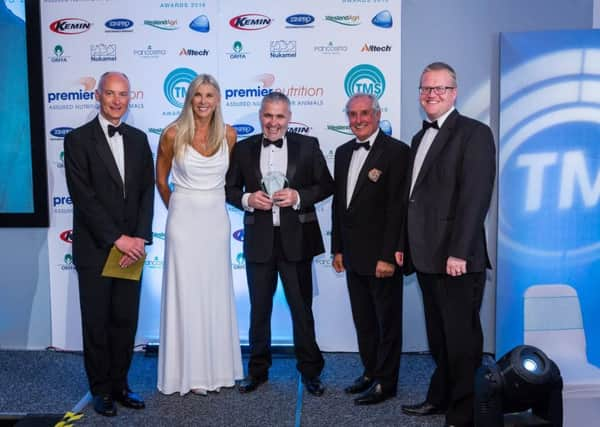Damian awarded for excellence in transition cow management


The Transition Management System (TMS) is a new service, provided in Northern Ireland by McLarnon Feeds, to help farmers determine how well their herd is transitioning into the next lactation.
TMS has been developed by the leaders in transition cow management and nutrition, UK based Premier Nutrition. Almost 40,000 cows from around 140 UK dairy herds are now being recorded on a monthly basis using TMS.
Advertisement
Hide AdAdvertisement
Hide AdDamian and his father Gerrard run a 160-cow Holstein herd at Ballygalget on the Ards Peninsula. The herd has a 305 day lactation average of 9,692kg at 4.24% BF and 3.08% PROT, with approximately 3,600kg coming from forage. Cows are fed on a simple system based on round baled silage, with all concentrates fed through the parlour.
Foot and udder health are a high priority on the Gilmore farm. Cows are foot bathed using 5% copper sulphate after each milking, and at 3.5m x 1.5m x 0.2m, the foot bath is designed to ensure excellent coverage of the feet. This routine, combined with a monthly visit from the hoof trimmer, has virtually eliminated digital dermatis from the herd. Dry cows are housed on deep straw beds for 2-3 weeks before calving, reducing stress and encouraging lying behaviour, which helps take pressure off the feet. Damian’s dry cows recorded a rolling average 2.3% lameness rate, compared with the UK average 6.9% across TMS-recorded herds.
Damian’s focus on udder health begins with the dry cows and extends to the milking herd. All cows are treated with a broad spectrum antibiotic and teat sealant at drying off, and care is taken to ensure these are applied correctly and contamination is prevented. High SCC cows are allowed up to 12 weeks dry to aid healing, but persistently high SCC cows and those which fail to respond to mastitis treatments are routinely culled. In the milking parlour, all cows are pre-wiped and post sprayed, and the vacuum/pulsation are checked regularly. A fully slatted cubicle shed and generous coating of sawdust applied daily to cubicles ensures the legs and hocks of freshly calved cows are always exceptionally clean. These measures resulted in 94.8% cows calving down with a low SCC (TMS average 87.8%), and a 89.5% cure rate for cows dried off with a high SCC (TMS average 66.4%).
Commenting on Damian’s success, Dr Ronald Annett, ruminant technical manager at McLarnon Feeds, said: “The great thing about TMS is that it focuses attention on much more than cow body condition or milk fever.
Advertisement
Hide AdAdvertisement
Hide Ad“It looks at the entire spectrum of transition health and nutritional issues, highlights what you are doing well, and helps identify the pressure points.
“I’m delighted that Damian’s hard work has been rewarded in this way.”
To find out more about TMS or sign up for the service, speak to your local McLarnons sales representative or telephone the McLarnon office on 028 9035 1321.